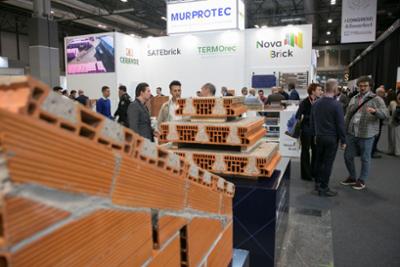

The Semana Internacional de la Construcción emphasises the necessity for the construction industry to enhance its focus on innovation, efficiency and cost-effectiveness.

The Semana Internacional de la Construcción serves to reinforce the importance of digitisation through BIM, process standardisation and industrialisation
The construction sector must enhance its innovation, efficiency and profitability, according to experts participating in CONSTRUTEC, held within the framework of the Semana Internacional de la Construcción, which opened today and will run until 8 November at IFEMA MADRID. This event, which includes the CONSTRUTEC, VETECO, SMART DOORS and PISCIMAD trade fairs, is also held to coincide with MATELEC, making up a unique exhibition offering with over 1,000 companies attending.
At the 1st Building the Future Congress, held in collaboration with Alimarket, the primary challenges confronting developers, builders, and distributors were examined. Alejandro López Navarrete, Director of Infrastructure and Capital Projects at Deloitte, highlighted the need for transformation in “the construction sector to improve efficiency and profitability across the value chain and align with sustainability regulations.” He believes that the most effective ways to enhance efficiency and profitability are through “digitalisation using BIM, standardising processes and industrialising operations.” Additionally, he considers the “use of sustainable, low-carbon materials, circularity and optimising energy efficiency throughout the full life cycle of assets to be crucial regulatory levers.”
He anticipates that “construction turnover in Spain and Portugal will continue to grow by approximately 7% between 2022 and 2026, driven by public investment and European funds.” Furthermore, he highlighted that “this sector is accountable for 60% of the country's resource consumption and the generation of 8 million tonnes of construction and demolition waste (CDW), in addition to 11% of greenhouse gas emissions.”
Distribution Concentration
Víctor Manau, president of ANDIMAC (the association representing professional distribution of building and renovation materials), stated that the distribution of materials is currently highly fragmented. “In Spain, there are 3,500 construction material warehouses, of which less than 10% generate a turnover of more than 3 million euros.” However, the sector is undergoing “a process of increased concentration, which is an inevitable and positive step towards greater professionalisation and added value.” He outlined the “transition from a linear supply chain model to a circular value chain model” and highlighted “the need for a collaborative culture to address the challenges of professional distribution.” He identified the following challenges: “digitalisation, productivity, size, generational change, cultural movement, sustainability, recognised identity, value redesign, attractiveness and prestige.”
Jorge Vega, General Manager of Bigmat Iberia, a group comprising over 240 independent distributors under a unified brand, emphasised the significance of pursuing “innovation” and highlighted the necessity for digitalisation, “which has the potential to enhance productivity.”
BIM Implementation
In addition to the Building the Future Congress, the Social Forum with the Construction Labour Foundation, the Ibero-American Forum with ASEFAVE and the BIM FORUM, among other events, were also held today as part of Semana Internacional de la Construcción.
At the BIM FORUM, a conference was held on the challenges and strategies of BIM implementation. David Barco-Berrilan, a member of the board of buildingSMART Spain, presented an overview of the level of BIM adoption in Spain. He highlighted that “nearly 12% of public construction procurement in Spain has BIM requirements, with the potential for this figure to reach 25%.” Furthermore, “the introduction of BIM in the General State Administration is expected to result in annual savings of 3.1 billion euros.” He also stated that “31.7% of Spanish companies have adopted BIM, 25.6% are in the process of doing so, and 32% have not yet implemented it. The data indicates that BIM is already in use in Spain.”
This was followed by a roundtable discussion on how to start implementing BIM, moderated by Miguel Morea from BIM Learning and attended by Ignacio Martínez from Vilor, Diego Muñoz from ASCH Infraestructuras, Borja Martin from CAD&BIM Services, Alberto Cerdán from CAATIE and José Collado from CAATIE. Another meeting on "How to Demand BIM" will be held, moderated by Sergio Muñoz from buildingSMART Spain. The following participants will be in attendance: Jaime Moreno from the Ministry of Transport and Sustainable Mobility; Fernando Iglesias from Kronos; Alberto Castillo from Aplicad; and Olalla Gómez from the Municipal Housing and Land Company of Madrid.
The Women Can Build conference, held as part of the Social Forum organised with the Construction Labour Foundation, focused on the promotion of women's training in construction. Rosalía Sánchez, International Projects Communication Technician at the Construction Labour Foundation, outlined the foundation's work in promoting equal opportunities and increasing the representation of women in construction. Women Can Build initiative was highlighted, which began in 2017 and is currently running its second edition with the support of the European Union. He stated that “the number of women in construction is growing rapidly. In 2023, 11.2% of the sector was female, representing a 5.1% increase over the previous year and a total of 154,837 women.”
Ibero-American Forum
At the Ibero-American Forum with ASEFAVE (the Spanish Association of Light Façade and Window Manufacturers), the situation of the markets, their challenges and opportunities, as well as the collaboration between Ibero-American countries in the construction sector, regarding solutions for façades and windows. The objective is to facilitate the exchange of knowledge and experience, as well as the establishment of business partnerships. In a recent interview, Pablo Martín, director of ASEFAVE, highlighted that “the window sector in Spain had a turnover of 4 billion euros in 2023 and that the outlook for 2024 indicates a stable outlook for the sector.” The sector generates an annual export value of €275 million, “with France and Portugal representing its primary markets.”
The forum also featured presentations from Alfredo De Hollanda of the Paraguayan Chamber of Aluminium and Glass-ALUVI; João Ferreira Gomes, president of ANFAJE (Portugal); José Manuel Barceló, president of the Board of Directors of AMEVEC (Mexico); and Filipe Gattera, executive president of AFEAL (Brazil). Also, there were: José Antonio Ventura, president of ASOVENSA (Dominican Republic); Mario Rodríguez, executive coordinator of APEVIC (Peru); Alfonso García, from the management team at ALCOVISE (Alcovise); and Guillermo Silva Lavín, general manager of ACHIVAL (Chile).




